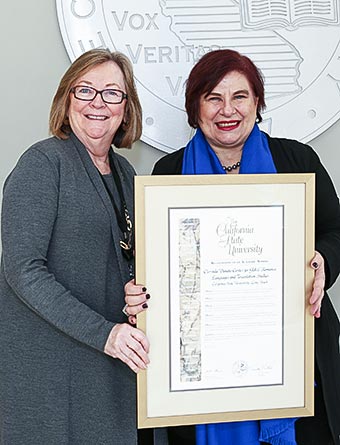Opening of the Clorinda Donato Center for Global Romance Languages and Translation Studies at CSULB
Donato Center Becomes Reality
By Richard Manly
(President Jane Close Conoley (l) with Clorinda Donato.)
The spring semester will see the opening of the Clorinda Donato Center for Global Romance Languages and Translation Studies at CSULB thanks to a $1.1 million donation by longtime supporter of Italian Studies Mario Giannini.
Named for the director of the George L. Graziadio Center for Italian Studies, Clorinda Donato, the center will support pedagogical research in two areas: Romance language intercomprehension, a strategy for multiple language communication and learning that targets language families, in this case, the Romance languages, and translation studies.
“It’s beyond my wildest dreams to see this center take shape,” said Donato, a member of the university since 1988. “It’s the proof that it is important to have dreams. If you never dream, you can’t go beyond your wildest ones.”
When Giannini made his pledge to establish the center, he explained that its importance stemmed from a variety of factors.
“The importance of languages and culture in peoples’ lives is, I believe, vastly underrated and underappreciated,” he said. “I hope in both the short and long-term that the center serves as a hub for the advancement of multilingual and multi-cultural study and learning. More importantly, I hope the center serves as an example of how the study of languages and the study of cultures develops people that are leaders in whatever fields and areas they choose to work after they spend time with the center or as part of their association with it.”
This will be the first center in the United States to promote intercomprehension and multilingual approaches to language teaching, strategies that boast a growing presence throughout Canada, Europe and Latin America.
“The overarching goals of the center are to establish collaborative, integrative and interdisciplinary educational and research programs in the networked teaching of the Romance languages and translation studies,” Donato explained. “The center intends to become a powerful tool for attracting preeminent scholars to its research projects. We seek to work with professionals who have a broad interdisciplinary profile and vision in multilingual teaching and translation studies so that skills of translation and language study can incentivize students to connect with a wide variety of other disciplines both within the College of Liberal Arts and with other colleges in the university.”
Donato noted that the field of translation studies has expanded greatly over the past 30 years.
“There is a confluence of many disciplines in translation studies these days,” she said. “Translation is a material practice as well as a cultural phenomenon that is open to critical analysis. Communication across linguistic-cultural boundaries whether regional, national or global has become a salient feature of many disciplines across the university. The center will provide for dedicated research and application in this growing area.”
Donato points out that the student bodies on university campuses in the U.S. are increasingly multilingual, not only in traditional areas of demographic presence such as California, Florida, Arizona, New Mexico and New York but also Illinois, Tennessee, Georgia and Oregon.
“Having a center like this sends a message that these topics are important,” said Donato. “Mario Giannini understood that and made it happen quickly. That’s one of the things that philanthropy can do. We moved rapidly to bring resources to disciplinary areas that the nation and the State of California need. By creating a center for translation studies, the CSU adds to its constellation of disciplinary fields an area that has been flourishing at many other universities in the USA and abroad. Translation Studies has also become a highly technical discipline, with new software programs and translation methods developing daily. It is a crucial component of the growing area of the digital humanities and we intend to set our sights on this direction of development as well. Translation for the purpose of language teaching is also an emerging field, one that we also hope to advance through the center’s projects. I’m happy that through Mr. Giannini’s commitment to language study and the humanities in the university curriculum that we can create a permanent presence for multilingual study and translation at CSULB and in the CSU overall.”
The Clorinda Donato Center for Global Romance Studies and Translation has such goals as creating an online training course for multilingual teaching in the Romance languages, providing short- and long-term visiting faculty appointments, offering research opportunities to faculty affiliated with the center’s projects and establishing a mechanism for language proficiency testing and the recognition of multilingual competence.
Donato was named outstanding professor in the 2016 University Achievement Awards and became a Chevalier of the French Order of the Palmes Académiques in 2005. She received her bachelor’s degree from UC Berkeley in Italian Studies, studied English and French Literature at the University of Urbino, and received her Ph.D. in Romance Languages, Literatures and Linguistics from UCLA in 1987.
Donato will know the center is succeeding when she sees increasing numbers of students who are interested in studying multiple languages and acquiring translation skills.
“I hope to see students who are interested not only in becoming highly proficient in more than one language but who have the opportunities to apply those skills through internships and admittance into graduate and professional schools for future careers of which languages and translation are components,” she said.
Private philanthropy has played a major role in establishing the center. Donato is particularly grateful to internal CSULB administrators and faculty who played a key role in developing the proposal, business plan and infrastructure required to make the Donato Center a reality. In particular, President Jane Close Conoley, Provost Brian Jersky, College of Liberal Arts Dean David Wallace, the Academic Senate Executive Committee and the Dean’s Council were instrumental in moving the approval process forward in an efficient and timely manner.

